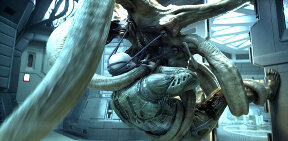So much good stuff, smcder. It's like psychological nutrients for me.
There is an anthropologist (I believe) who makes this very assertion. I'll have to do a web search for him/his work. He says that the human species
began as a result of utilizing - or perhaps relying on - technology. If I recall, he cited the use of the sling women could use to hold their babies while foraging. Because human babies were being born with increasingly larger brains/skulls, nature had to compromise and eject them from the womb about 3 months too early... thus human babies are (near) completely helpless (known as
the fourth trimester). Only with the use of the sling was this "process" able to continue.
I don't think the concept of Life transitioning from an organic to inorganic (non-carbon) medium violates this principle. I'm suggesting that Life simply spreads wherever and however it can. Kurzweil identifies a pathway for Life to make such a transition. (My contention has always been, since I first read this idea, "how do we know this hasn't already happened somewhere in the universe billions/millions of years ago?)
At the same time, I think this sentiment makes sense as well. Re: Langan: Absolutely, according to Langan, for something to persist in the absence of constraints, it must be self-sustaining; for something to be self-sustaining, it must have structure. In other words, God isn't the begetter of Life: God
is Life.
Physicists are baffled by the observed structure/order of the universe. Indeed, its structure is such that Life can exist, leading to the Anthropic Principles which say if the universe wasn't just so, we wouldn't be to here to observe it.
Perhaps there should be an
Uber Anthropic Principle which would state: If the Universe didn't have a self-sustaining structure, it wouldn't exist.
If people didn't have hair, there would be a lot of useless combs lying around, right?
What I was trying to capture was the apparent ability of Life to spread, adapt, move, advance, and thrive whenever/wherever it can.
When I speak of Life, I'm not speaking
necessarily of human life. I'm referring to Life as if it were a force such as gravity... it just is regardless of the medium its
acting on. And as far as asking: must Life have had a beginning; I think that's a great question. Langan's model suggests that the Universe
is Life (a self-sustaining, cybernetic structure), so the argument could be made that Life began the moment the universe began. (Moreover, consciousness will have as well.)
Re: biophobia. I'll have to read those articles, but one could also question the opposite: biocentrism or biosupremacism.




 .
.